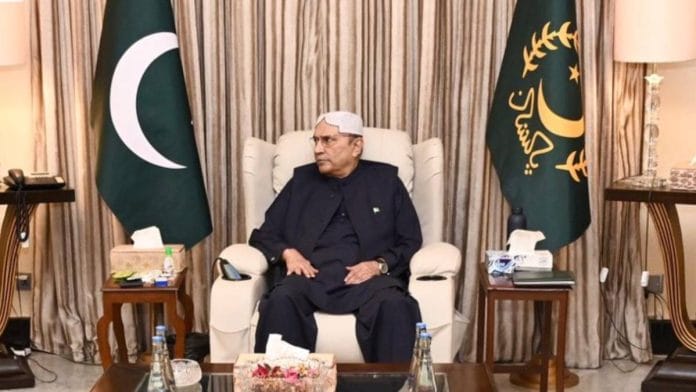New Delhi: Fearing what he believed was an imminent coup d’état by his Generals, a dangerously-ill President Asif Ali Zardari armed himself with a loaded gun as he boarded a medical evacuation flight, his one-time spokesperson and senior Pakistani politician Farhatullah Babar has revealed in his memoir The Zardari Presidency (2008-2013): Now It Must Be Told, published last month.
Zardari also insisted on being accompanied by his former ambassador to the United States, Husain Haqqani, in defiance of Supreme Court orders barring the diplomat from leaving the country.
Babar’s memoir reveals that President Zardari was fearful for his life, in the wake of revelations that Haqqani had lobbied the US to back sweeping political changes designed to end the Pakistan Army’s role in political decision-making.
The dramatic events at the helipad at the President’s official residence took place at the end of 2011.
According to Babar, Zardari had been complaining he had been “demonised and wronged”. “I was accused of every crime on Earth,” the President said, “even of killing my brother-in-law; I was accused of tying a bomb to the leg to extort money.”
Emotionally strained, Zardari suffered a sudden medical event in the middle of this speech. “Each word struggled to come out of his mouth,” Babar records. “Then, the stutter vanished and he turned pale. His head swung to the right as he slipped on the sofa.”
A valet on the President’s staff, Babar writes, succeeded in administering emergency medication, and also removed Zardari’s socks “which were moist with sweat”. Although Zardari was resuscitated and moved to his bedroom, it was clear he needed hospitalisation.
The President’s doctors suggested moving him to the Army’s Institute of Cardiology or Combined Military Hospital for emergency cardiac tests. Zardari, however, flatly refused to be treated at a military hospital, Babar recalls. The real-estate tycoon Malik Riaz, a close friend of Zardari, also arrived and advised against going to a military hospital.
Amid these conversations, Babar writes, Army Chief General Ashfaq Parvez Kayani called and insisted on speaking to the President. Zardari’s associates “apprehended that a recording of an incoherent monologue might later be used to declare the President incapable”. “Whether right or wrong, the distrust was palpable.”
The next morning, 6 December, 2011, Zardari’s son Bilawal Bhutto Zardari—later to serve as the country’s foreign minister—arrived to see his father, together with his aunt Azra Fazal Pecheho. Bilawal insisted that his father be moved to a private hospital in Karachi by helicopter, and then flown to Dubai, if needed.
In the lounge, though, fears began to mount among Zardari’s confidants about what might happen if he left the country. “Conspiracy theories floated around in whispers,” Babar writes, “Haqqani will soon throw in the towel and become an approver.”
Also Read: FM Muttaqi’s Deoband visit signals Taliban sharpening daggers for Pakistan
‘I know he will fight to the last’
Following the May 2011 raid which led to the discovery and killing of al-Qaeda chief Osama bin Laden in Pakistan’s Abbottabad, Haqqani was alleged to have sent a memo to then-US Chairman of the Joint Chiefs of Staff, Mike Mullen, suggesting asserting civilian control over Pakistan’s military. The memo also discussed dismantling military agency Inter-Services Intelligence’s (ISI) Section S, which maintained links with the Taliban and al-Qaeda.
The memo was leaked by Mansoor Ijaz, a controversial Pakistani-American billionaire who Haqqani is alleged to have used to route ideas on the civilian takeover to influential figures in the US establishment.
Fearing Haqqani would be used as a witness against him, Zardari had housed him in the President’s palace. He now insisted Haqqani fly with him to Karachi, and onwards to Dubai.
This plan, however, was resisted by both Prime Minister Yousuf Raza Gilani and Haqqani, who pointed out that he was barred by the Supreme Court from leaving Pakistan. Gilani noted that news of their departure would provoke headlines that the President and the diplomat had fled Pakistan.
From his sources in the military, businessman Riaz learned that orders had been issued for any aircraft carrying Haqqani to be denied permission to leave Pakistan’s borders.
Zardari, together with Haqqani, then boarded one of the two helicopters parked, engines running, on the helipad at the President’s palace. An aide arrived to say permission had been denied for an air ambulance to evacuate the President directly from Nur Khan airbase, in Rawalpindi.
The President’s personal doctor, meanwhile, refused to board Zardari’s helicopter: “I know he has a gun. I also know that he will fight to the last.”
Even as the President prepared to take off, the Prime Minister reappeared to say authorities in Dubai had not given permission for an air ambulance. He persuaded Zardari to remain at home.
The next day, a deal was hammered out for Haqqani’s wife, Farahnaz Ispahani, to accompany Zardari, while Haqqani himself would be moved to the Prime Minister’s home. That way, Zardari reasoned, Haqqani would be insulated from military pressure, while his wife could provide a first-hand account of events in case a coup took place.
(Edited by Nida Fatima Siddiqui)
Also Read: A real estate mogul, a ‘mad bully’ & an ex-PM: Inside Pakistan’s Bahria Town corruption scandal






